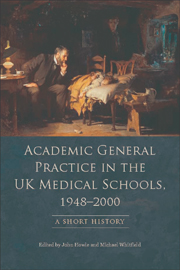Book contents
- Frontmatter
- Contents
- Preface
- Acknowledgements
- Abbreviations
- Timeline
- Introduction
- Dedication
- 1 The University of Aberdeen
- 2 The University of Dundee
- 3 The University of Edinburgh
- 4 The University of Glasgow
- 5 The Cardiff University School of Medicine
- 6 Academic General Practice in Ireland
- 7 The University of Birmingham
- 8 The University of Bristol
- 9 The University of Cambridge
- 10 The University of Exeter
- 11 The University of Leeds
- 12 The University of Leicester
- 13 The University of Liverpool
- 14 The University of Manchester
- 15 The University of Newcastle
- 16 The University of Nottingham
- 17 The University of Oxford
- 18 The University of Sheffield
- 19 The University of Southampton
- 20 The London Medical Schools
- 21 The University of St Andrews
- Appendix 1 Primary Care in the New Medical Schools
- Appendix 2 The SIFT/ACT Negotiations
- Appendix 3 An Overview
- Appendix 4 And Finally…
- Index
Appendix 4 - And Finally…
Published online by Cambridge University Press: 05 August 2013
- Frontmatter
- Contents
- Preface
- Acknowledgements
- Abbreviations
- Timeline
- Introduction
- Dedication
- 1 The University of Aberdeen
- 2 The University of Dundee
- 3 The University of Edinburgh
- 4 The University of Glasgow
- 5 The Cardiff University School of Medicine
- 6 Academic General Practice in Ireland
- 7 The University of Birmingham
- 8 The University of Bristol
- 9 The University of Cambridge
- 10 The University of Exeter
- 11 The University of Leeds
- 12 The University of Leicester
- 13 The University of Liverpool
- 14 The University of Manchester
- 15 The University of Newcastle
- 16 The University of Nottingham
- 17 The University of Oxford
- 18 The University of Sheffield
- 19 The University of Southampton
- 20 The London Medical Schools
- 21 The University of St Andrews
- Appendix 1 Primary Care in the New Medical Schools
- Appendix 2 The SIFT/ACT Negotiations
- Appendix 3 An Overview
- Appendix 4 And Finally…
- Index
Summary
The last decade has been a time of considerable change for academic primary care. At the turn of the millennium, where the main departmental stories end, there was a record number of stand-alone departments of primary care/general practice across the UK and a recently reinvigorated workforce thanks to pump priming monies from the 1997 Primary Care Research and Development Review. There was also a palpable step change in the depth, quality and international standing of British primary care research, reflected in the results of the 2008 RAE. Indeed a recent benchmarking exercise comparing the volume and quality of original primary care research published by six countries with well-established academic primary care found that UK primary care researchers ranked first or second in every citation metric examined. The establishment of the NIHR school for primary care research in England in 2006 also reflected both the priority given to and the excellence of academic primary care research. The school comprises the eight leading academic centres for primary care research in England and has access to £4 million each year to fund cutting-edge collaborative research. There are similar though less-funded schools in Scotland and Wales. Primary care academics have also been instrumental in continuing to develop and deliver community-based undergraduate medical education, which now makes up a large part of every medical school's curriculum.
- Type
- Chapter
- Information
- Academic General Practice in the UK Medical Schools, 1948-2000A Short History, pp. 143 - 145Publisher: Edinburgh University PressPrint publication year: 2011



